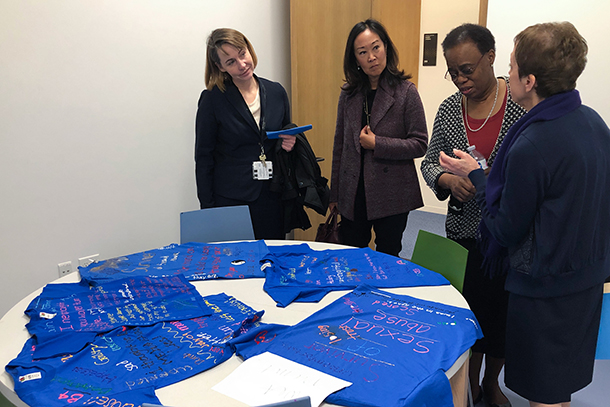When Gail Abarbanel, MSW, started working as a social worker at a hospital in Los Angeles, she discovered that there was a profound gap in services for survivors of rape and other forms of sexual assault.
In an era when rape was rarely spoken about, and only in hushed tones, there were no specialized services for survivors who needed care and treatment. There was a need for an array of services — specialized medical care, forensic services, counseling and other forms of psychological support, advocacy and access to information about victim rights and options. These services needed to be available 24 hours a day.
The Santa Monica Rape Treatment Center was created to meet these needs. Over time, the RTC expanded its services to include trauma-informed care for children and adolescents, training for providers of victim services, and prevention education programs.
Leaders from USC — including interim President Wanda M. Austin, Chief Health Officer Saran Van Orman, MD, of USC Student Health and Leslie McMorrow, who serves on the Board of Directors of The Rape Foundation — met with RTC founder Abarbanel and Beth Cranston, RTC senior director and legal counsel and the manager of the medical/forensic clinic, to better understand the scope and range of RTC services and the way this care is provided. The RTC is one of the most widely recognized facilities for comprehensive, state-of-the-art sexual assault survivor care in the country.
“We want to learn from you — and support the work of Dr. Van Orman — so together we can best serve our students, particularly our survivors,” Austin said. “On the prevention side, we want to provide education and training to increase awareness and bystander support, as well as to foster a culture that does not tolerate violations against any member of our community.”
Today the RTC has a dedicated, private medical/forensic clinic, available 24 hours a day, providing survivor care in the immediate aftermath of a sexual assault. The RTC also provides ongoing counseling, advocacy, and other support services. All services are free.
The USC group walked through all of the RTC facilities, including the medical/forensic clinic, to better understand the process and the various services and resources that are available to USC students, faculty and staff.
“There is absolutely a need for specialized care for survivors of sexual assault,” Van Orman said. “We can learn from the RTC’s many years of experience how to integrate their services with ours so that students can receive the best and most comprehensive care possible.”
USC Student Health services, including support for sexual assault survivors through the Relationship and Sexual Violence Prevention and Services department, has established pathways to care with the RTC, and with other prominent local organizations with specialized expertise, including Peace Over Violence, a sexual and domestic violence, intimate partner stalking, child abuse and youth violence prevention center headquartered in Los Angeles. Brenda Ingram, USC’s lead on sexual assault prevention, services, and education, has 30 years in education and supporting survivors, and most recently served as the director of clinical services for Peace Over Violence prior to joining the university.
Van Orman and the USC Student Health, Relationship and Sexual Violence Prevention and Services team are currently working to expand victim advocate services to provide more personal navigation when services are required outside of USC. While they are in the process of developing longer-term programs, they have also tackled some smaller improvements — including a new Lyft service account specifically for survivors in crisis that has recently been created for USC students.


